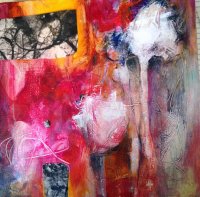But Evil Shall Come
Answering the Questions

image by Lorraine Douglas
1. Give an example of how language, poetry, art, or even humour, can serve to unmask a 'principality or power’ that's crossed the line?
I think of our modern belief that science can save us as a principality and power. We look to science to save us from everything from the Corona virus to climate change. But if we do not learn as a species to live morally we will continue to put ourselves in harms way. I like how a TV show like Black Mirror can show us the downsides of our technology and scientific accomplishments. To me it points to the fact that we need something greater than science to save us. Much like the prophet tells the prophet that their advanced science, their astrological achievements, will not save them.
- Cal
Just this week it was announced that Britain's huge baby Trump blimp will be donated to the Museum of London as an example of political satire art. This is what immediately came to mind when thinking about "unmasking a principality or power.” Nothing captures the self referential, egotistical leadership that we've seen over the last few years, and it feels good to have it announced so publicly. At the same time, I wonder how I would feel if a giant version of my worst self followed me around Winnipeg, floating high for all to see. I think the approach to reach my heart and affect changes needs to be something much more subtle.
- Penny
Music has an ability to cut through the lies of empire. During our 2nd in-real-life worship at the Heinrichs last summer, I was struggling with inward depression even while I was hearing the truths of Eldon’s homily about Jacob’s ladder. A feeling of worthlessness gripped me. Paul had a harmonica solo and it was there I could finally breathe a bit. Something lifted. I looked around the circle of my faithful friends and heard “Whoever you are, whatever you’re going through, the ups or the downs [Jacob’s ladder], someone in this circle will help interpret it and you’ll find your way through.” It was one of my most memorable moments of grace last year.
Art also has a power to unmask principalities and powers. Personally, I can look at how often calligraphy or playing with watercolor has calmed me and given me a taste of transcendence and “forgetting” of what was troubling me. In culture, I love seeing the power art has such as the many Winnipeg murals which quietly and beautifully tell courageous stories or the beautiful art that has sprung up along Winnipeg’s river trails. The colors and expressions all say, there’s more to our mortal life than what meets the eye.
Humor has been one of my best friends of my life, helping me through relational difficulties and lightening many troubling times. It can be a glue like no other. I remember the first time humor became a beacon for me. In the aftermath of my sister’s death, my sister Lorie had a pajama party and her friend Avery was the life of the party. She made everyone howl with laughter and I was drawn to her jokes like a moth to light. I stood outside the closed basement door, listening to them one after another. The dark mood of our house was lifted.
In Watershed, humor can often help us tease out the ways we take ourselves too seriously.
- Lydia
This morning I saw this glove in the snow on my way home from walking with Bev.

Among other things we had talked about a niggling insecurity I had about something she had said that was rattling around in my head like a pebble in a tin can. We talked and she clarified her comment and the pebble disappeared. She didn’t say anything I hadn’t thought off but I hadn’t been able to sort it myself. I needed to hear it outside myself.
When I saw the glove it reminded me of how despite all our best efforts, our technology can’t save us. And yet God addresses us and finds us, maybe especially when we are lost like that glove. And God does this through embodiment. In our life together in community we each embody the life Christ has worked in us over the years. We reflect this life to each other. Not all the time, and not in the same way, but Christ’s life is embodied so that each of us can hear from outside ourselves the Life God created for us. And this Life frees us from whatever snow bank or exile we are stuck in. Frees us to enter the world with hope.
- Linda
I have been really enjoying the New Yorker cartoons lately. They are clever and subtle in their witty outcry of both the Pandemic and the Trump-state. It’s like they’ve come up with the perfect recipe knowing exactly which ingredients to use to gather up everyone’s experience through pathos and humour, hitting our collective experience at its most pithy and personal, and at the same time, catching us at our most universal in one finely tuned illustration. These daily moments of relief appeal globally and are a good stand-in for a world-wide “court-jester.”
Others who have served as court jesters have been the likes of Stephen Colbert and John Oliver. Watching becomes a ritual of purging, giving space for some daily venting of our frustration at how insane and unbelievably corrupt politics have become. Hard to look away from a train wreck as they say. The sad ridiculous nature of it all sometimes called for a good dose of levity. Power has a tendency to crumble under the weight of a well-timed joke.
There were some truly brilliant, almost prophetic moments, in that Old Testament way, when anger became articulated in such an incisive way that the Emperor’s nakedness truly became apparent while at the same time, giving voice to the hope for a more just and authentic world. I imagine where the challenge comes is knowing how to walk the thin line between truth-telling and self-righteousness which can quickly turn to blind vengeance and unchecked emotional/demeaning targeting. It’s easy to use any art-form or creative expression for our unconscious motivations. These platforms can quickly become snidey sounding boards for our own selfish agendas as opposed to creating a higher road for the greater good.
Our passage could easily read as “The Humiliation of America”. As we were reading Brueggemann this morning Paul and I kept on saying “wow this is America”. You might as well just press “Replace All”. As tempting as it is to find ‘joy’ in our ‘lament’ over America’s demise, there’s also something unsavory in wishing upon a whole people nationwide judgement in that ancient tribal retributive way. While there is a leveling and an accounting that we all need as a people (individually and collectively), when we have gone astray from God’s path of justice and mercy, we will only be healed of our infidelity when we confess with honest and humble hearts who we are without a deep loyalty to God and the harm we have caused as a result.
God’s saving judgement is never meant to obliterate anyone. Our prayer for our Southern neighbours this morning went something like this: that all sides, all parties, those we disagree with and those we align ourselves with would be restored to a deeper identity that is not connected to a flag or national pride but in being Yahweh’s children, loved and released into a freedom that is more than just a rigid Constitutional amendment.
- Bev
3. Yahweh in this chapter is seen directly involved in the historical process. What’s the danger of this way of interpretation?
How to integrate theology and history is at the root of my questioning. It has been for a long time, ever since I learned that "snakes don't really talk” (in Genesis). To distinguish between myth and history is not nearly as hard as telling the difference between history and theology. For instance, in our study of Isaiah, we encounter a God who is decidedly on the side of the Israelites. I am tempted to think of this assertion as a theological statement directed toward suffering, exiled people in need of encouragement and upliftings. Is Isaiah's rhetorical language (against the Babylonians) God's own perspective, or is it culturally determined and nationalistic? Throughout the Bible, we discover that God hates individual nations, God loves all nations, God prefers one nation. Are these situational perspectives or historical certainties?
I have been habituated to thinking the Bible is inspired (god-breathed) 'profitable for life and faith.' My faith in Jesus just won't let me affirm that God hates nations since, when it comes down to it, all countries are, to some degree or another, self-interested and ethnocentric. Babylon, Rome, Persia, England, and America were great empires full of great promise and incredible hubris. Humans all striving for domination over one another, thinking themselves the best nation on earth. Empires also aspire to usurp God. David in the Psalms speaks of the nations railing against God. Does God desire to crush these nations with an iron rod? Or does God desire to heal them and restore them, embracing them all as chosen?
I have whatsoever no idea about the answer to these questions. The only intuition I have is that theology and history are different disciplines which strive at distinct goals. History seems to be about describing events that can be substantiated through artifacts, whereas theology seeks to hear God's voice giving guidance in people's contextual settings. From a historical point of view, Cyrus is not Israel's messiah; but theologically, Isaiah declares he is. Historically Cyrus restored Babylon to her former glory when he conquered her, propping up Marduk as the regional God. Cyrus was religiously tolerant of all the nations that he conquered. The Babylonian priests saw him as a servant of Marduk.
This seems to suggest to me that whenever a deity has a hegemony (dominance), from a spiritual or political point of view, it turns into a national idol; whereas if the God of Israel and the God of the Babylonians are limited expressions of the Father of Jesus or the God beyond our gods, all can celebrate that one God's sovereignty of love. The historical process moves inexorably forward through all kinds of events and personages. God's spirit empties Godself, suffering along with human beings everywhere. God also seems to inspire and celebrate human ingenuity and creativity and promotes imagination and compassionate action.
As I said, I don't have an answer to my question, but I do have a theological desire, one shared by St. Anselm of Canterbury:
O Lord my God.
Teach my heart this day,
where and how to find you.
You have made me and re-made me,
and you have bestowed on me all the good things I possess,
and still I do not know you.
I have not yet done that for which I was made.
Teach me to seek you,
for I cannot seek you unless you teach me,
or find you unless you show yourself to me.
Let me seek you in my desire;
let me desire you in my seeking.
Let me find you by loving you;
let me love you when I find you. Amen.
- Paul
Community
"God is always for us. Even when He must be against us, He is for us." - George MacDonald